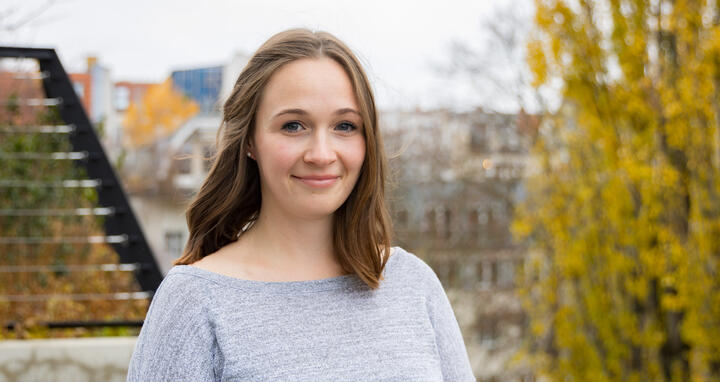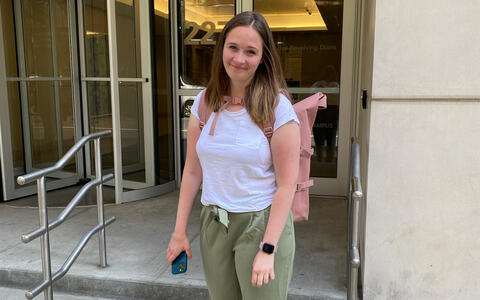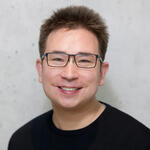“I gained self-confidence in New York”
How did you come to the Max Delbrück Center?
I started working in the lab of Leif Ludwig at the Berlin Institute for Medical Systems Biology of the Max Delbrück Center (MDC-BIMSB) in January 2021. Before that, I applied to different institutes, but the possibility to go abroad in a structured, international exchange program during my PhD was one of the main reasons I decided to join the MDC.
You spent about a month at New York University (NYU) in the summer as part of the working group of Professor Aristotelis Tsirigos in the Applied Bioinformatics Laboratories at NYU Langone Health. How did this cooperation with the Research School come about?
Some group leaders advertise collaborative projects specifically tailored to this program. For my project, I looked for a group leader at the NYU who would fit well with our project myself online.
Working in a lab with a view.
What was it like for you as a PhD student to undertake the search on your own?
It was really exciting to see how the working style in the US compared to ours.
I was looking forward to it. My group leader supported me, I could always rely on that. But, of course, I did get a bit nervous before flying to New York. It's one thing to get in touch with people and meeting them virtually via Zoom, and completely different to actually be in their lab. But I was welcomed very warmly, and everyone was extremely open.
Overall, I learned a lot - From establishing initial contact and brainstorming together on what we could potentially research to seeing how a collaboration between multiple labs works. And, it was really exciting to see how the working style in the US compared to ours.
Experiences abroad with the German-US PhD Research School
What's different about a lab in New York?
Our collaborating lab works, different to our group, purely in bioinformatics, which differed in working hours and structure. But also the collaboration itself and the mentality was a little different – much more open. I learned a lot from their perspective on results. When it comes to my data, I'm sometimes a little more pessimistic. In New York, I often spoke to Bettina Nadorp, an assistant professor there, about my project and the newest results. With data that at first glance didn't look as expected, she still found something exciting that could help me move forward. Back in Berlin, I try to adapt this.
How do you envision the impact of this German-US-American collaboration on your PhD project?
Since the start of my PhD, I have been collecting blood and bone marrow samples from patients who received a stem cell transplantation to understand how the stem cells in patients regenerate and repopulate the blood system. For that, we sequence the nuclear DNA and DNA of the mitochondria, i.e., the cell's energy producers, at the single-cell level. We then look at the open chromatin of the cells, so, areas where the structural material of the chromosomes is more easily accessible as well as mutations in the mitochondrial DNA. This allows us to draw conclusions as to which cells in the blood, like T or B cells, derive from which stem cells in the bone marrow. The Tsirigos Lab has established and published a biomedical machine learning method that complements the type of data analysis we do here at MDC-BIMSB and can add an exciting and different perspective.
How did your stay abroad specifically advance your doctoral work?
As I have a wet lab background, I learned a lot about the fundamentals of bioinformatics. This allowed me to gain greater confidence in my data analysis. Even though my data was not yet ready for their method to be applied, while I was in New York, we made a plan for how I could do this in the future. Once ready, I may visit the Tsirigos Lab again.
As a doctoral student for the International Research School Lena travelled abroad to work at the Translational Research Building of NYU for her PhD project.
Why did you consider it so important to work abroad during your doctorate?
During my master's studies, I spent time in Boston, which I really enjoyed. And since then, I have always wanted to spend more time in New York, so the program was a great fit. New York itself is just incredible. And while I was there, I found some incredibly nice people, with whom I spent a lot of time with also outside the lab, which was very precious, too. I also now have a second supervisor for my doctoral thesis as Dr. Tsigiros is also on my thesis advisory committee – that was one of the prerequisites for the exchange and an additional advantage for my project.
What should one bring with them for this PhD research school?
What unites everyone in the program is that we all have a lot of fun working on our projects. In general, I think you must be passionate about your project, otherwise it might be difficult to set up an international collaboration. I'm not particularly extroverted, but I am open, independent, and proactive. This is important.
This interview was conducted by Christina Anders.
Further information
- The “MDC-NYU PhD Exchange Program
-
-
The MDC-NYU PhD Exchange Program aims to train the next generation of systems biologists and strengthen collaborations between the Max Delbrück Center and international partners, such as NYU and the University of Edinburgh. All participating doctoral students work in a research group at MDC-BIMSB and have the opportunity to spend up to two years in a lab abroad. A selection committee conducts interviews and selects a maximum of two candidates for the program per application round. All participants meet several times a year to exchange ideas.
PhD at the Max Delbrück Center
The research of Aristotelis Tsirigos








